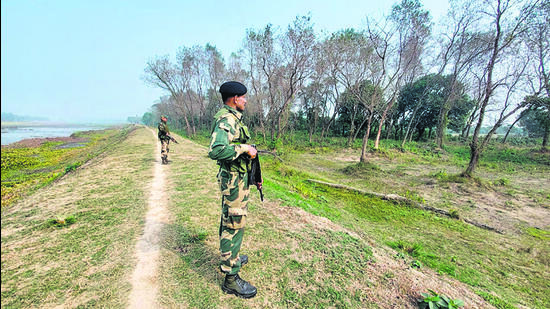Tensions simmer at Bengal’s border as India, B’desh spar over frontier fencing
Tensions rise at the Indo-Bangla border as BSF's fence construction faces objections from BGB, with villagers supporting BSF
Uttam Mondal, 41, a farmer from Sabdalpur village in West Bengal’s Malda district, was still all charged up as he narrated details of the January 5 face-off between the Border Security Force (BSF) and Border Guard Bangladesh (BGB) that saw villagers from the bordering areas of both countries gathering at the spot as tensions ran high over the construction of a fence on the Indian side along the Indo-Bangla border.

“I haven’t seen anything of this sort in my life. Hundreds of villagers from Sabdalpur and Sukhdevpur gathered on the road, which runs along the border fence, chanting Bharat Mata Ki Jai,” Mondol said, waving his arms passionately as he described the incident that happened in the two villages standing right on the edge of the Indo-Bangla border, around 50km south of Malda town.
“Fencing already exists along the border in this area, barring a small stretch of 1.2km. BSF was trying to install the fences to plug the gap, when BGB objected. The situation flared up when a few hundred Bangladeshi villagers intervened and tried to confront BSF. When the news reached us, we all took up whatever arms we could find to confront them and help BSF,” added Jiten Mondal, 26.
BSF officials explained that if any permanent structure, such as a border fence, has to come up within 150 yards of the international border, it has to be agreed upon by the border guarding agencies of both countries after a joint verification.
HT visited the spot to find out what prompted BSF to construct a fence within 150 yards of the border (although it is on Indian land). Much of this area is low-lying, and is a wetland for most of the year. The fencing couldn’t have come up on this land forcing the BSF to construct the fence closer to the border.
“BGB had agreed to our proposal of constructing fence on our land way back in 2016. Land acquisition was done over the next few years. In March 2024, we informed BGB that we would start constructing the fence. Work started in April 2024. They never raised any objections. During the monsoon the area was waterlogged and work was stalled. In November when the work resumed, BGB suddenly started raising objections,” said a senior BSF official who asked not to be named.
That’s likely because of a regime change.
In August, Bangladesh witnessed a massive political turmoil. Former prime minister Sheikh Hasina had to step down on August 5 and fled to India. An interim government headed by Nobel laureate Muhammad Yunus took over. Since then, relations between the two countries have chilled.
“We man around 52km of the international border, a major portion of which has been already been fenced. This 1.2km stretch is located within 150 yards of the border. In some areas it is as close as 70 yards to the border,” a BSF official posted in Malda said on condition of anonymity.
The fencing work has now been stalled, with efforts on to resolve the impasse, officials said.
On Sunday, India’s envoy in Dhaka, Pranay Verma, was told by Bangladesh foreign secretary Mohammad Jashim Uddin that the “unauthorised” construction of border fencing by the BSF was a matter of “deep concern”. On Monday India summoned Bangladesh’s most senior diplomat and informed him that all security measures on the frontier were in keeping with existing agreements and protocols.
But even as diplomats attempt to resolve the issue, tension is simmering in the area.
Indian farmers complain of Bangladeshi miscreants destroying crops.
The metalled border road runs parallel to the barbed-wire fence. Green swathes of cropland growing maize, wheat, pulses, and mustard lie across the fence in some cases. The border itself is marked by pillars (or posts) that are farther away.
“You see these farmlands right across the fence. From the fence, right up to the border pillar, it is our land. We have croplands here and there are also some families living in these intermediate lands. But often Bangladeshi miscreants come and destroy our crops and water pumps,” said another farmer, Subhas Mondal, who has three bighas (around 2 acres) of farmland across the fence.
Along the barbed wire fence, which run for several kilometres, are huge iron gates.
The BSF issues permits and identity cards to villagers living in these areas to cross the fenced boundary and cultivate their land. The farmers are allowed to go in every morning and required to come back before sunset. There are also a couple of Indian households, which are located in this intermediate land between the fence and the international border.
“Bangladeshi miscreants sometimes come at night and steal our crops. If we spot them, we chase them away with the help of BSF. Such incidents seem to have increased over the past few months,” said Khitish Mondal, 46, a villager.
India has always maintained that the fence is needed to check smuggling. Until the regime change, Dhaka agreed.
“It may seem very peaceful during the day. But at night the situations change. Miscreants smuggle items such as cough syrup, cattle, gold and fake Indian currency,” said a senior BSF official who asked not to be named. The first two are smuggled out and the other two, in. Then, there are infiltration attempts. “BSF has foiled several such attempts in recent weeks. BSF personnel have also been attacked,” said a senior official.
On the night of January 11, patrolling units of the 119 battalion seized a consignment of 565 bottles of cough syrup. On January 10, around 15-20 people from the across the border attacked a BSF patrol with sharp weapons while flashing high-beam torches in the eyes of the soldiers, trying to cause temporary blindness. BSF had to fire in the open to thwart the bid.
BSF and BGB on Wednesday held a sector-commander level border coordination meeting at the Petrapole-Benapole frontier.
“Important issues of mutual interest including developmental projects, construction of border fencing and measures to combat cross border crime were discussed,” said a senior official of BSF’s South Bengal Frontier.
West Bengal shares a 2,216 km-long border with Bangladesh — the longest stretch of international border shared by any state in India with a neighbouring country. Some stretches are still unfenced making this border highly porous.
“Fencing has helped to bring down criminal activities along the border. The fence would have helped both the nations to check cross-border crimes. We really don’t know why BGB is objecting. Even they are not convinced with their own reasons sometimes, it appears,” said another BSF official who asked not to be named.








